How good are our economists? Look around. On a 20-minute walk to my Berkeley office, I walked past people reeking of urine, past people lying in a dirty sleeping bag on a thin cardboard pad, past some garbage around a tent which housed a child who grew up into an impoverished adult.
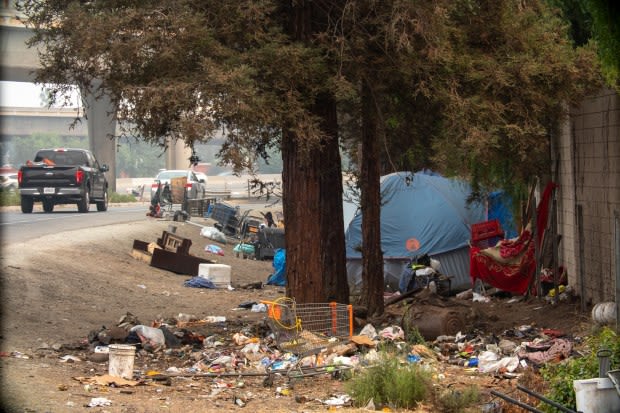
In what world is this broader system a success story for economics?
In this world.
Economics is important.
The availability heuristic can deceive you (although Kaj Sotala notes that e.g. the Bay area homeless may be benefitting less from growth than the global poor). If you just look out your window, you might miss important global trends.
Good economic policy has lifted billions of people out of poverty and furnished our lives with previously unimaginable splendor. The Roman emperors had no air conditioning or telephones.
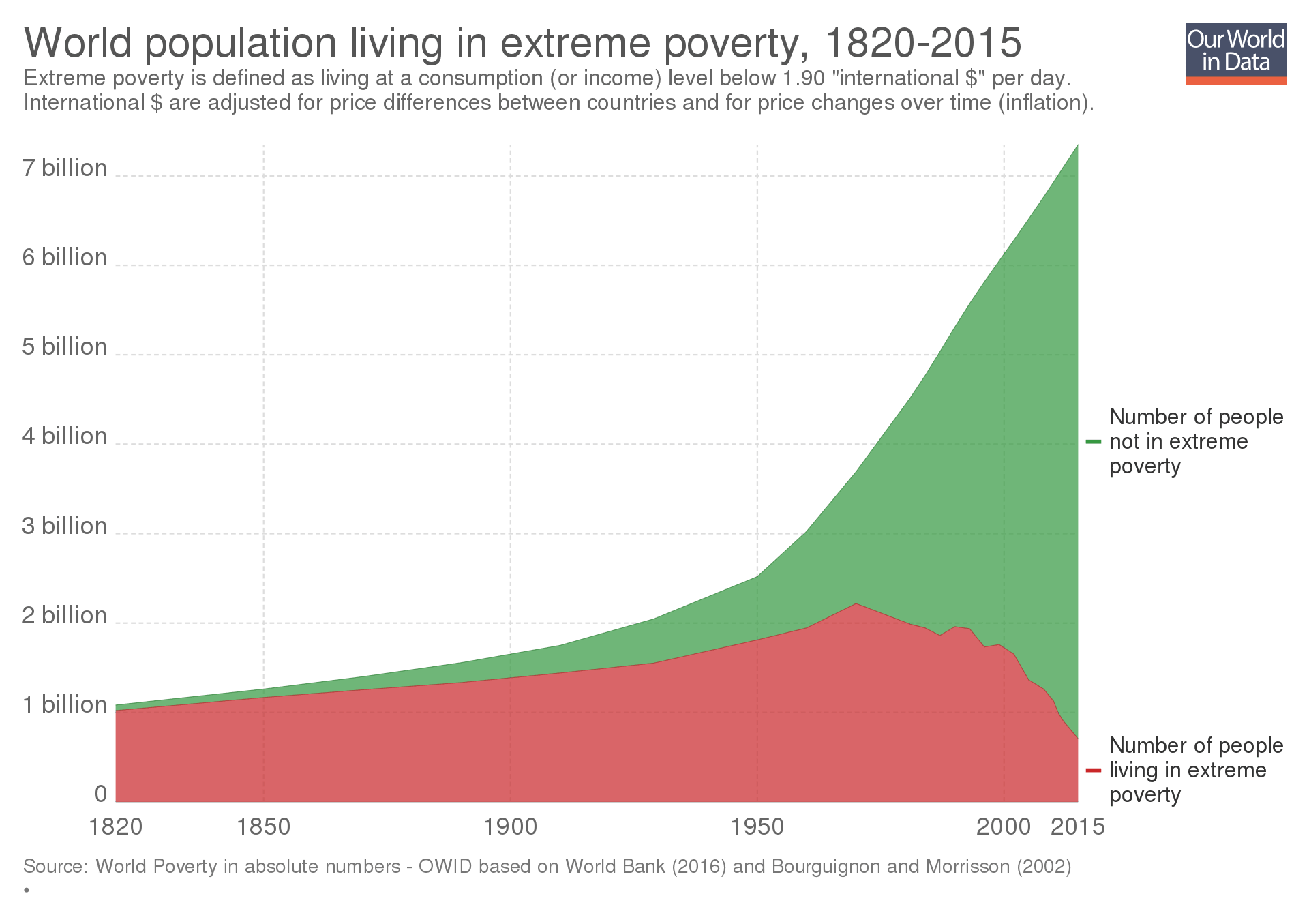
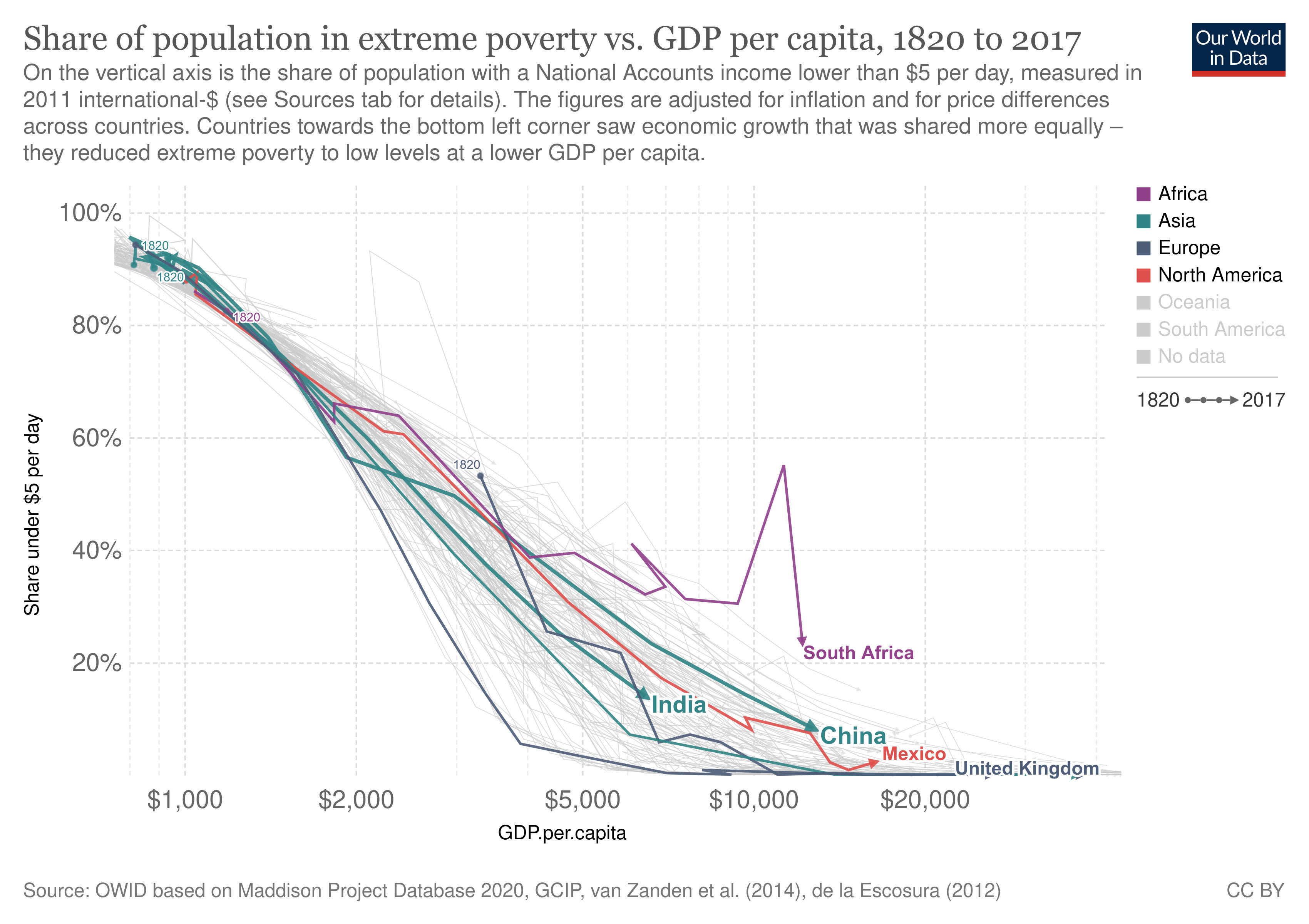
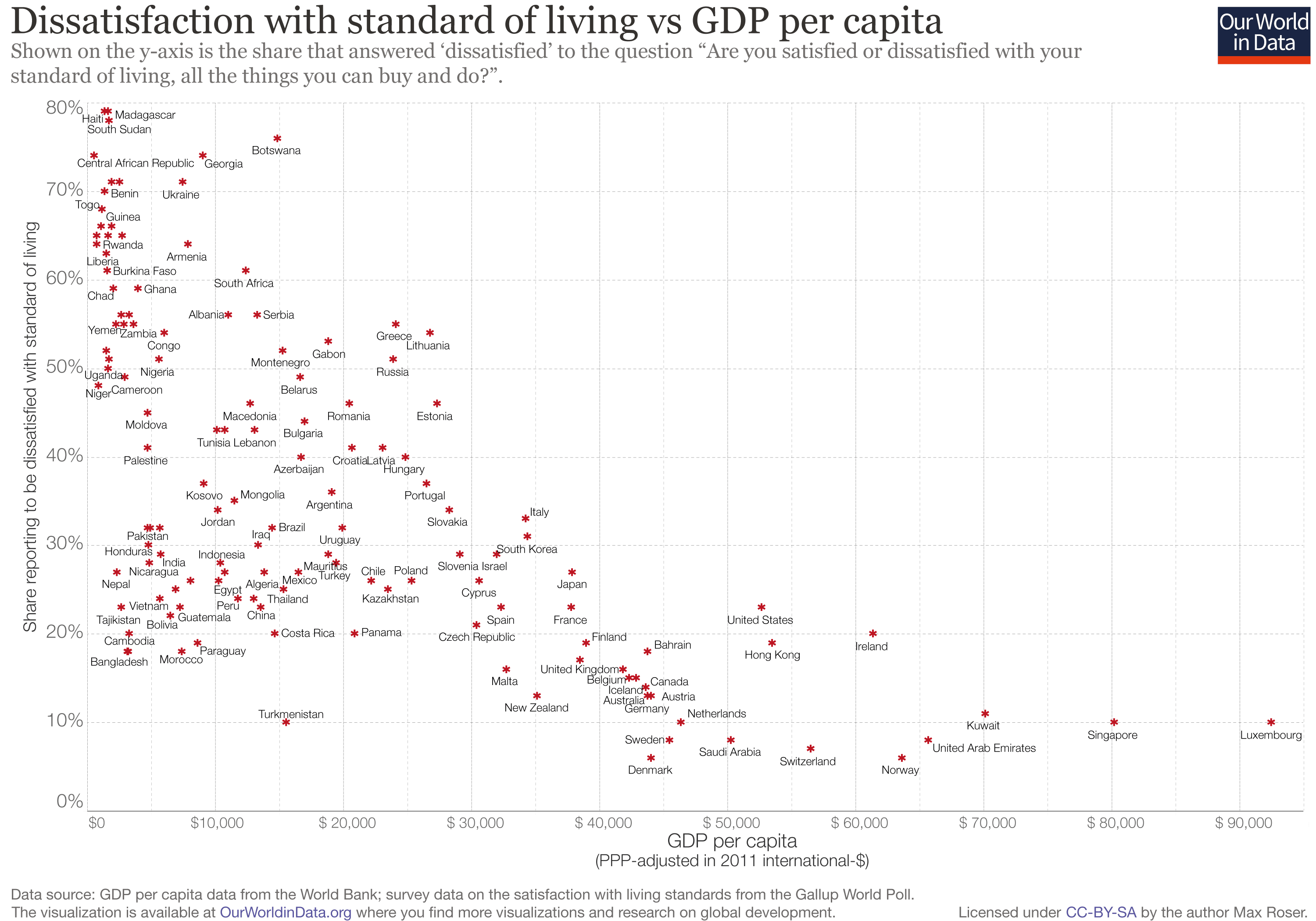
Economists are not responsible for all of this growth. I wasn't able to quickly find counterfactual estimates for the importance of economic theories, but my impression is that several advances in economics have in fact significantly improved economic policy.
Good economic policy is a weapon against suffering, against disease and disorder and squalor, and perhaps one day against death itself.
Good economic policy makes selfish actors conspire to deliver cheap, delicious pastries to your doorstep in less than an hour.
Good economic policy is often about expanding the pie, instead of fighting over who gets what part today. This very moment, a vast universe full of energy and resources burns away.
Before reading this book, I tried some other econ textbooks. They were bad. Before the bad textbooks, economic analysis had seemed like "just another consideration." I'd taken an econ class in college, and kiiiinda remembered what "deadweight loss" meant.
When I read Cowen and Tabarrok's Modern Principles of Economics, I regularly felt beliefs getting debunked and replaced with less wrong beliefs—an experience last felt while reading the sequences.
As a teenager, I thought that:
- stimulus = good because obviously people need money in a recession, and they'll spend that money
- tax cuts = bad because they won't be spent as much, and usually tax cuts are just excuses to reduce tax burden on the rich
- outgroup members thought homeless people were lazy, but obviously that wasn't usually true, and those homeless people need direct fiscal help
- price gouging is bad because it's wrong to take advantage of people in emergencies
But I didn't know anything about aggregate demand, or the costs/benefits of expansionary fiscal policy, or poverty traps, or prices-as-signals. I'd basically just absorbed sentiments from my political upbringing—I recently noticed that I disliked "supply-side economics" without even knowing what that is! These sentiments were sometimes mostly right, and sometimes incredibly wrong.
This book brought me two benefits. First, it introduces important frames for thinking. Second, it has lots of interesting facts and compelling philosophical arguments.
So let's go.
The prisoners were dying of scurvy, typhoid fever, and smallpox, but nothing was killing them more than bad incentives. In 1787, the British government had hired sea captains to ship convicted felons to Australia. Conditions on board the ships were monstrous; some even said the conditions were worse than on slave ships. On one voyage, more than one-third of the men died and the rest arrived beaten, starved, and sick. A first mate remarked cruelly of the convicts, "Let them die and be damned, the owners have [already] been paid for their passage."
The British public had no love for the convicts, but it wasn't prepared to give them a death sentence either. Newspapers editorialized in favor of better conditions, clergy appealed to the captains' sense of humanity, and legislators passed regulations requiring better food and water, light and air, and proper medical care. Yet the death rate remained shockingly high. Nothing appeared to be working until an economist suggested something new. Can you guess what the economist suggested?
Instead of paying the captains for each prisoner placed on board ship in Great Britain, the economist suggested paying for each prisoner that walked off the ship in Australia. In 1793 , the new system was implemented and immediately the survival rate shot up to 99%. One astute observer explained what had happened: "Economy beat sentiment and benevolence."'
The story of the convict ships illustrates the first big lesson that runs throughout this book and throughout economics:
Incentives matter.
How do people decide what to buy and where to work, what opportunities to take and where to build? Microeconomics models decision-making by consumers and firms. Basic microeconomic models assume that people want to make money, and they're good at it—they are rational. Unsurprisingly, this isn't quite true, but the models let us easily think about what incentives people have in different situations.
(We can add corrections to the Econ 101 arguments later. I think this is better than throwing up your hands and saying "Econ doesn't have all the answers, people are too complicated!")
The most important microeconomic frame I deeply internalized was supply/demand curves.
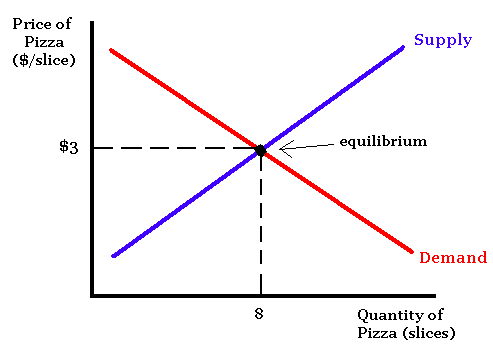
Law of supply: Firms want to supply more pizza if you'll pay them more; the supply curve is increasing.
Law of demand: Consumers want to buy less pizza if you charge them more; the demand curve is decreasing.
(Not all markets follow these "laws.")
I significantly sharpened my understanding of incentives by internalizing how to shift supply/demand curves. So let's reason through a contentious question with this frame:
I think price gouging should usually be legal (and most economists agree)
This section serves both as an epistemic spot check and an explanation I wish I'd read when I started learning econ. Skip if it's old news to you.
Price gouging occurs when an emergency happens (e.g. a blizzard), people demand a lot of some good (e.g. snow shovels), and so stores jack up the prices (e.g. $4 -> $30).
Consider a competitive snow shovel market, where firms can price shovels as they please (or, far more accurately: in response to economic conditions). When demand increases for snow shovels, that's a positive demand shock because people want to buy more shovels. The demand curve moves out to the right, from D to D':
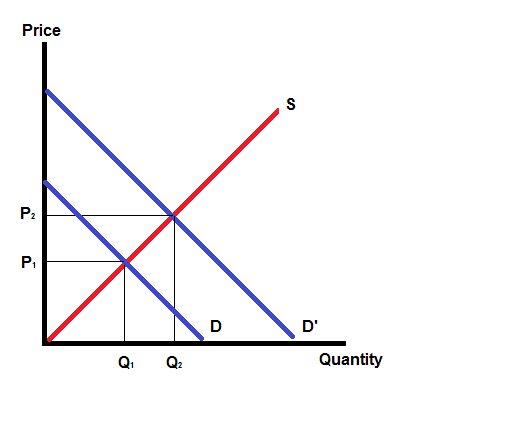
Because people want more snow shovels, the price increases from to . (This is the "price gouging" part.) So here is the painful part of the picture. Now snow shovels are expensive, and some people can't afford them, and also fuck you to the people taking advantage of a disaster just for a few bucks. Many people have this gut-level reaction.
But what comes next? Suppose the storm hits Wisconsin. Demand goes up, so prices go up. Since firms want to make money, suppliers in neighboring states (e.g. Iowa and Illinois) will start trucking in snow shovels and selling them at a high—but slightly lower—price. In fact, the hardest-hit areas with the highest prices will get prioritized for more supply, so that firms can make more money. As more firms enter the Wisconsin snow shovel market, they compete over price and eventually the price settles back to the original as demand subsides.
Prices are signals about which places want which goods, and free markets maximize social benefit when firms make money by responding to those price signals. The high price of snow shovels is like a huge neon sign which spells hey if you bring more snow shovels here you can make a lot of profit!
Some laws ban price gouging. In certain industries and during an emergency, firms basically can't raise prices unless they can prove that their operating costs / input costs increased.
Suppose that the snowshovel price can barely increase from due to a so-called price ceiling.
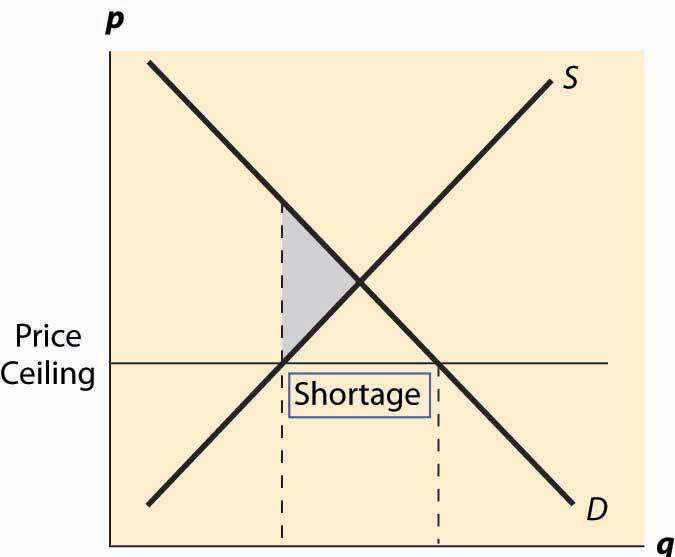
Then there's a shortage, because more people are willing to buy shovels at (what a deal, especially in an emergency!) than suppliers are willing to sell at . There's no economic incentive for them to increase production, and incentives matter. But set aside profit-making for a moment.
The price signal—that big neon sign—is no longer present. Suppose you own a chain of shovel stores throughout the midwest USA, and all you care about is getting shovels to people who need them. Several cities all got hit by the winter storm. Which one needs the most shovels? How many?
Because there's a price ceiling, you can't tell. So you send more shovels to all the cities, but some get too many shovels and some get too few. The shortage remains, and people can't get enough snow shovels, but at least they aren't getting cheated, right?
In the price-gouging world, yes, some people pay more for shovels. A key issue seems to be inequality: Many poor people won't be able to afford shovels. But price-gouging has several benefits:
- Firms profit by supplying more shovels
- Firms know which areas need shovels the most, because they're the areas with highest prices
- People with the highest willingness to pay will pay higher prices, ensuring that shovels don't get misallocated to people using them for trivial reasons
- In shortages, people don't pay extra money, they pay extra time. They pay search costs as they drive around town and look online for places with shovels. In fact, the rational consumer pays up to (willingness to pay - artificially low sticker price) in search cost, erasing the supposed benefit to consumers.
- At least a bribe has someone getting paid! Consumer time is wasted.
- Who do you think has the ability to drop everything and run to the store to get a few shovels before they're all gone? Are they probably poorer, or probably more wealthy?
- So it's not clear that anti-price-gouging laws even help poor people.
(Since people hate price gouging so much, large firms like Wal-Mart may decide not to raise prices and just sell out to preserve reputation, while smaller vendors gouge away. Thus you can get the "best of both worlds" without anti-price-gouging laws.)
I note that this picture assumes a competitive market; in particular, other firms can enter to sell shovels and compete to drive down prices. If that's not true, then I think that the arguments for price gouging are much weaker.
The best argument I can think of against price gouging is that people are probably more irrational and manipulable during an emergency. I don't think this overrides the other benefits of price gouging. I looked around for other counter-arguments and didn't find any I thought were good.
So that's the theory. How do things work back on planet Earth?
The empirical situation lines up with the theory.
These results support standard economic theory regarding price ceilings and counter political rhetoric in support of anti-price-gouging (APG) laws. When APG laws bind, counties may also experience shortages, increases in the total price paid for goods and services due to waiting time, and adjustments on non-price margins such as quality adjustments, the development of black markets, and rationing by violence.
— The Effects Of Anti-Price-Gouging Laws In The Wake Of A Hurricane
Remember the toilet paper hoarding of early 2020? APG laws are partially to thank.
The bottom line is: In an emergency, there won't be enough shovels for everyone to get a shovel at standard price. If you want a long shortage, if you want to feel moral and avoid being blamed—outlaw price gouging in competitive markets.
I'm sure you'll be absolutely shocked to learn that lots of states make price gouging a criminal offence.
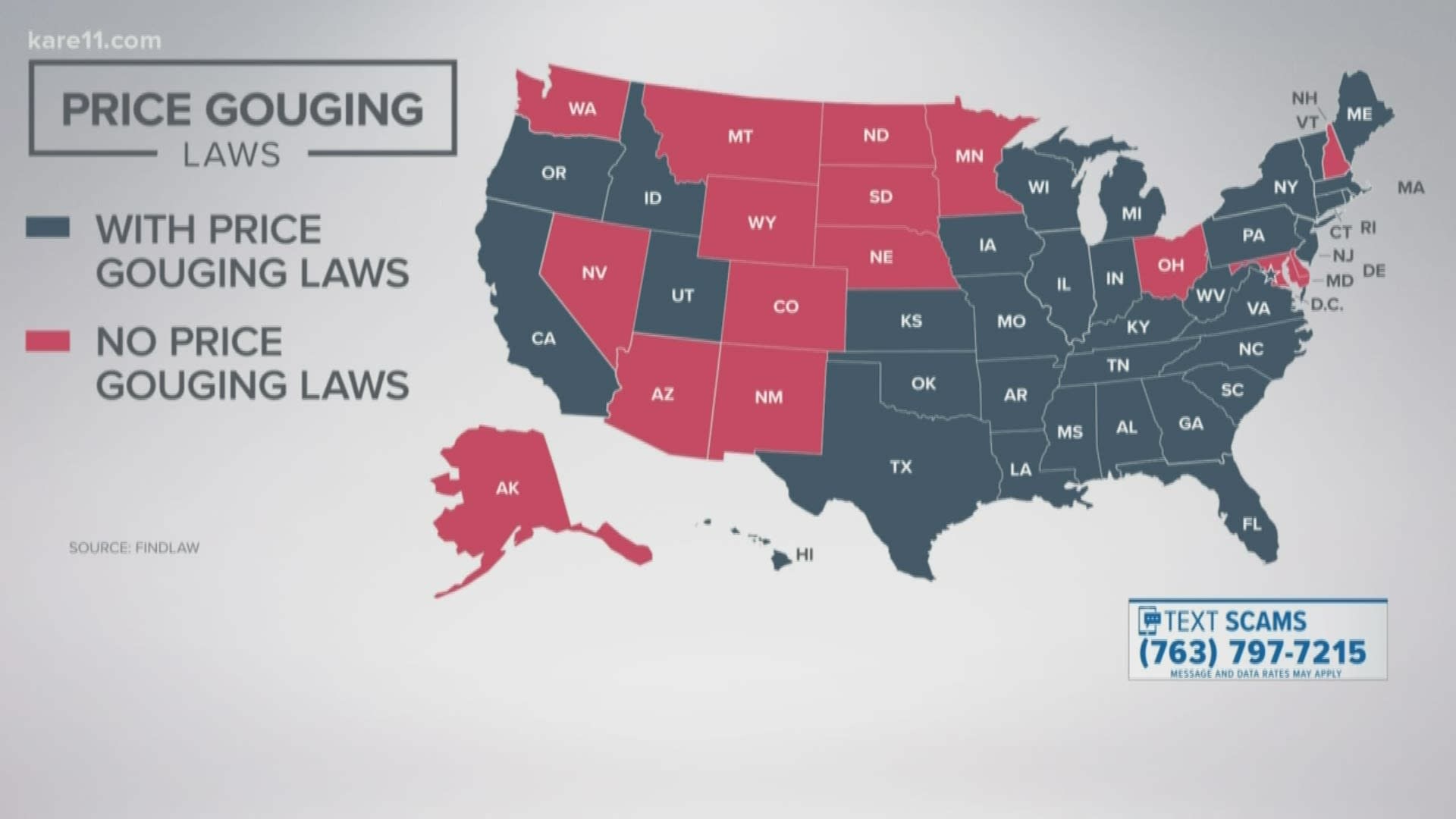
How do demand shocks ripple?
By this point in the book, I've pinned down supply/demand curves. This was actually a bit tough, because I got caught up in the dynamics of how e.g. demand shocks in one industry would ripple through the economy. The answer was: Don't worry about it. That's much harder. Just focus on supply/demand curves, and everything will be OK for now.
Determining tax incidence
Another great mental motion is the "wedge" trick for tax incidence determination.
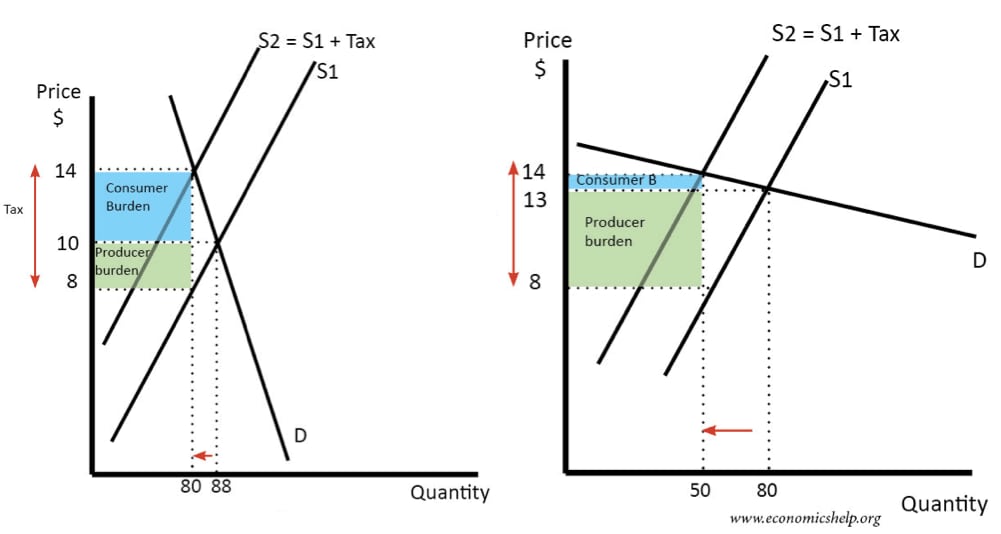
Think of the tax as the difference between what the consumer pays and the seller receives. Tax incidence answers: How much does the consumer pay, and how much does the seller receive?
The "wedge trick" is this. Consider a vertical line segment of length 6 in the above charts, and imagine it floating in from the left until it hits S1 and D with its endpoints. This determines tax incidence: The supply curve shifts up to S2. (This is actually the same as just shifting up S1 by $6, but I find it easier to visualize.)
If demand is more elastic than supply (aka the slope is less steep), then consumers bear more of the tax burden, and vice versa. The intuition is that it's harder to tax people who are more ready to stop consuming/producing the product.
Surprisingly, statutory incidence—who writes the check to the IRS—doesn't matter. The tax incidence is the same whether you charge consumers $6 more for buying cigarettes, or producers $6 more for selling cigarettes.
Other updates
Before I talk about the book holistically, here are more snippets:
- The much-maligned capitalism is actually probably the greatest incentive alignment success in human history.
- This is the whole point made by the "invisible hand" idea: Competitive markets "invisibly" have each firm produce until price equals marginal cost, and this minimizes total cost to society. While each firm pursues selfish interests, they advance societal goals by creating huge amounts of value in order to make money.
- (Just think about how much you'd be willing to pay for glasses, and how much you actually have to pay! And that market isn't even that competitive! Isn't consumer surplus amazing?)
- Rent controls are bad. Controls on competitive markets are generally bad.
- I gained gears-level models for when government should or shouldn't be involved in a market.
- Sweatshops are bad but probably better for children than whatever else they would have been doing.
- The Econ 101 argument goes: If the children had something better to do—like go to school or work at a safe, well-paying, age-appropriate job—they would do that instead of working at the sweatshop.
- A firm perfectly price discriminates (PPD) if they charge each consumer their willingness to pay for a good. I really hope that firms don't somehow achieve PPD via AI before the singularity. That would really suck. You'd basically be just on the edge of every single purchase you make—exhausting. And producers would gobble up surplus from consumers, which seems unfair.
- Custodians in the US have higher real wages than custodians in India, even though they may be equally good at cleaning. This is because American custodians are more (economically) productive since they work for more productive firms.
- The marginal product of labor (MPL) is the revenue from hiring an additional worker.
- A custodian at Google is adding more value than an equally custodian at a small Indian firm.
- Therefore, they have higher MPL, and are paid more.
- Concretely: American custodians average $30,906/year. Adjusting for Indian purchasing power parity, that's equivalent to rupees. The average Indian custodian only makes ₹120,726/year—less than a fifth the American wage.
- Your wages aren't just determined by your skills and your work ethic, but by the rest of the economy. It pays to work in a wealthy economy!
- I had looked forward to learning about fractional reserve banking, ever since HJPEV reflected on the crudity of the Gringotts banking system. "What a sophisticated-sounding economic idea", I thought. "I'll need to study carefully to understand that one day", I thought.
- I thought wrong. Fractional reserve banking is stupidly simple. Banks keep a fraction of deposits on hand as "reserves", in case customers want to make withdrawals. The rest of the deposits are loaned out. These loans put the money to work, growing the economy with people's savings while also ensuring that people can withdraw their money.
- This is why "just lock your gold underground" Gringotts is dumb: The wizarding economy could be growing using some of Lucius Malfoy's money. Lucius, Gringotts, and the economy would benefit from this arrangement.
- This is a general pattern: The key concepts in economics do not require nearly as much mental scaffolding as math concepts do. (Try explaining topological continuity in three sentences.)
- Applying economic reasoning is still a delicate endeavor, though.
- I thought wrong. Fractional reserve banking is stupidly simple. Banks keep a fraction of deposits on hand as "reserves", in case customers want to make withdrawals. The rest of the deposits are loaned out. These loans put the money to work, growing the economy with people's savings while also ensuring that people can withdraw their money.
- I now know what the Federal Reserve is and what they do.
- And I now appreciate how hard central banking can be.
- And I now appreciate how great it is that we let actual economists run this part of the government. Even if they sometimes mess up.
- And I now appreciate this huge body of literature on interest rates and quantitative easing and M1 and market monetarism and agh! I'd always consigned the finance section of the paper to "inscrutable garbage that daytraders worry about", but it's so much more. I can't wait to keep learning about macroeconomics.
- The fact that wages are sticky-down is so annoying. I would be so mad if I were a central banker: dumb human bias ruining our ability to deflate! Dumb human bias making negative AD shocks horrible!
- The dumb bias seems to be nominal wage confusion—responding to the dollar amount on your paycheck (the nominal wage), instead of to the goods you can buy with the money (the real wage).
- In a negative aggregate demand shock, nominal GDP growth decreases. Normally firms could just lower wages for all their employees and real output would remain the same. But people hate hate hate seeing nominal wage cuts, and so it's easier for firms to just fire people, or at least raise real wages far more slowly than inflation.
- Which cuts actual growth in the short run.
- What a mess.
Reflections
- I'm very glad that I've used Anki. I probably made over 500 cards for this book, not only for the key vocab but also for charts, for brain-teasers, for cool pieces of reasoning the authors used. Cloze deletions are fast and convenient for all of these purposes.
- This book is long. 800 pages long. It covers both micro- and macro-economics, and I was pleasantly surprised by the macro part. I'd heard macro is garbage, but I think it's just less understood than micro.
- investopedia and econlib are great resources for learning about economics.
- It took a while for me to get comfortable with economics. At first, I felt uncomfortable and reluctant to read more, because everything seemed mildly confusing. Now I can read papers (with great effort) and have a good idea what they're talking about. Learning more is now easy and fun; I've crossed the hump for economics in the same way I crossed the hump for mathematics.
- I'm glad I read this book. It's long, and maybe I could have skipped some of it. I didn't get much out of the advanced indifference curve chapter; it wasn't presented clearly. Most of the book was quite clear.
Conclusion
Economics is interesting, and powerful. Famine used to haunt most of the world, and now it doesn't.
Famine seems to be the last, the most dreadful resource of nature. The power of population is so superior to the power of the earth to produce subsistence for man, that premature death must in some shape or other visit the human race. The vices of mankind are active and able ministers of depopulation. They are the precursors in the great army of destruction, and often finish the dreadful work themselves. But should they fail in this war of extermination, sickly seasons, epidemics, pestilence, and plague advance in terrific array, and sweep off their thousands and tens of thousands. Should success be still incomplete, gigantic inevitable famine stalks in the rear, and with one mighty blow levels the population with the food of the world.
— Thomas Malthus, 1798. An Essay on the Principle of Population.
Appendix: Open questions I have
I haven't seriously looked into these questions yet.
- What's going on with market monetarism and quantitative easing?
- In particular, I still find open market operations confusing for some reason.
- Why isn't the risk-free rate subtracted from capital returns?
- I suspect this is just government being dumb.
- Why aren't all contracts indexed to official inflation estimates?
- Wouldn't this significantly cut down on arbitrary wealth transfers from inflation/deflation?
- TIPS is indexed. What else?
- This can't be explained by dumb government; contracts are private.
- Why do firms in a cartel have individual incentive to raise price above competitive?
- IE: Why isn't competitive pricing a Nash? If one firm unilaterally raised prices, wouldn't the other firms just sell more in their wake?
- What is the shadow banking system?
- Study the impossible trinity of international economics.
- How does free banking work?
FN: SRAS. Talk about some awful upwards-sticky prices; I wonder what the effect on SRAS is? I'd guess that ceilings probably aren't binding for long enough to show up much macroeconomically.
Thanks to LessWrong for feedback on this post.
The wealthy may benefit from the existence of low-skilled labour, but compared to what? Do they benefit more than they would from the existence of high-skilled labour?
Yes, they benefit from low skilled labour as compared to no labour at all, but high skilled labour, being more productive, is an even greater benefit. If it weren't, it couldn't demand a higher wage.